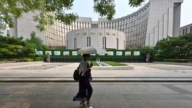【新唐人2014年02月11日訊】進入2014年以來,中國大陸一線城市土地市場熱度不減,「地王」頻現。但房屋市場卻出現有價無市的尷尬情形,1月樓市成交量甚至下跌過半。同時,中小城市的樓市崩盤案例也不斷增加,寒意甚濃。地產大佬任志強10幾年來首度提及房市風險。中共黨媒更是罕見發文說:中國房地產泡沫崩潰時間就在今、明兩年。
進入2014年,北京房市也遭遇寒冬。與去年同期相比,1月份北京新建商品房簽約量大幅下降53.9%。二手房的成交量環比下降20.1%,同比下降55.2%。成交均價環比下降1.87%。這已經是北京二手房成交量、價,連續兩個月出現下滑。
同樣,廣州樓市也是一片低迷。大陸媒體報導,1月份全市新建商品房成交量環比下跌16%,同比下跌48%,創下了去年1月以來的最低成交量。中心區樓價環比下降達10%。
美國南卡羅來納大學教授謝田:「北京、廣州、深圳等一線城市新房和舊房的成交量都在巨幅下滑,這實際上可能就是中國樓市全面崩潰的開始。」
但即便房屋銷售遭遇寒冬,各大城市的土地市場依然熱度不減,成交額偏高。其中僅北京、上海、深圳、杭州四個城市的土地出讓金就已經突破一千億元,各地「地王」接連出現。這顯示一線城市的房市虛火還在上升、高燒依然不退。
大陸財經評論專家「牛刀」日前發表博文《中國房地產面臨全線崩潰》,其中談到,中國房地產的操盤手現在仍然幻想,像2009年那樣,用「地王」來刺激提升房價上漲,這是典型的黔驢技窮。
「牛刀」談到,民間統計數據顯示,在600個三、四線城市中,去年有360個城市的房價下跌,有些甚至跌去50%。
2月8號,中共黨媒《新華網》罕見刊文表示﹕「專家稱,中國房地產泡沫崩潰時間,就在今、明兩年。」凸顯大陸房地產問題的嚴重和緊迫。
另據美國《大紀元時報》中文網報導,中國新年前夕,山東省某縣政府向工作人員佈置了一項特殊任務,要求他們:在2014年必須幫助售出兩套新建商品房。這也是繼鄂爾多斯等地陸續出現「鬼城」之後,大陸房市危機的又一「奇特風景」。
此外,土地銷售也成為這些城市的難題。據統計,2014年主要靠賣地還債的地方政府需要償還債務2.萬3800億元。有國土局工作人員表示,有些出售地塊條件不好,但也得想辦法聯繫開發商、把地賣出去。
謝田:「中國房地產的破滅,我預計應該是從二線、三線城市大面積開始,慢慢也會影響到一線城市。」
謝田還談到,大陸「錢荒」出現的一個主要原因,是因為銀行投入房市的大筆貸款被套牢。隨著房市價格不斷被推高,再加上銀根緊張,大陸房地產泡沫必然崩潰。
為應對房市危機,大陸當局試圖通過建造更多保障性住房等措施,來放緩主要城市的房價上漲速度。但這遭到中國金融智庫研究員,中國問題學者鞏勝利的質疑。
中國金融智庫研究員鞏勝利:「如果中國大面積的建這種保障房,超過三分之一,那可想而知,中國的房地產只會兩極分化,因為這種雙軌制,對市場經濟體制源頭,造成的災難非常大。」
鞏勝利強調,雖然不動產登記等措施在西方國家有效,但在中國這種計劃經濟和市場經濟並存的雙軌體制中,共產黨式的統治制度和市場經濟相背離,當局如果採用法治國家的方法來管理不動產,為房價加溫,但又不願意改變戶口等計劃體制,實際結果很可能會是:泡沫越來越大,「鬼城」越來越多。
採訪/朱智善 編輯/李謙 後製/孫寧
Chinese realty gets a chill in the year of horse, state media say collapse nears
China’s land market in first-tier cities is still lively as 2014
kicks off, with “land kings” showing up frequently.
But an awkward situation has appeared in the real estate
market where valuable house aren’t being purchased, and
the property market turnover has even fell by over half in Jan.
Meanwhile, increasing property market crashes cases
in mid-sized cities have only added to the chill.
Real estate tycoon Ren Zhiqiang once said
housing market risks would be felt in 10 years.
Now, in a rare occurrence, CCP mouthpiece media say
China’s real estate bubble will collapse this year or next year.
Beijing house market also suffered a harsh chill entering 2014.
Compared to January last year, Beijing’s new commercial
house contract volume has dropped by a hefty 53.9%.
Second-hand housing turnovers dropped 20.1%, down 55.2%,
and the average price of transactions fell 1.87%.
It’s been two consecutive months of decline for Beijing
second-hand housing turnovers and prices.
The Guangzhou property market is also in a downturn, with
mainland Chinese media reporting that the new commercial
housing turnover fell 16% in January, down 48%, marking the
lowest turnover since January last year.
Building prices in central areas are down 10%.
Xie Tian, University of South Carolina economics professor:
“The huge decline of new and old house turnovers in Beijing,
Guangzhou, Shenzhen and other first-tier cities may be
the beginning of China’s overall property market collapse."
Although housing sales are in decline, the land market in big
cities is still bustling with high turnovers.
Land transfer fees have broke 100 billion yuan ($16.5 billion)
in Beijing, Shanghai, Shenzhen, Hangzhou;
land kings are appearing one after another.
This means that the housing market in first-tier cities
is still rising and the frenzy hasn’t quit.
Chinese Financial expert Niu Dao recently published on his
blog an article titled, “China Real Estate facing collapse."
He says Chinese real estate speculators still plot
and scheme to inflate house prices on overvalued land,
which is typical when serious panic is setting in.
Niu Dao says the civil statistics show that housing prices fell
in 360 cities among 600 third and four-tier cities last year;
and some even fell by 50%.
On Feb. 8, CCP mouthpiece Xinhua published
a rare article with experts saying China’s property bubble
will collapse within two years.
It highlights the serious urgency of China’s real estate problem.
The Chinese website of U.S. based Epoch Times reports that
on Chinese New Year’s Eve, a county government
in Shandong province assigned its staff to a special task:
They must help sell two new commercial houses in 2014.
This is another strange episode of housing market crisis
following ghost city in Ordos and other places.
In addition, land sales have become a problem in these cities.
Statistics show the local government must pay 2.38 trillion
yuan ($393 billion) in debts relying on selling land in 2014.
Land Bureau staff say they have to find developers to sell the
land even some land selling conditions are not good.
Xie Tian: “I expect China’s real estate bust
should largely start from the second and
third-tier cities, slowly affecting the first-tier cities."
Economics professor Xie Tian says the major reason for
the money shortage in mainland China is because
the big loans going into the housing market are trapped there.
The mainland real estate bubble will inevitably collapse with
continually high housing prices and tight monetary situation.
In response to the housing crisis, the Chinese authorities tried
different ways to slow down rising housing prices,
including by building more affordable housing.
But Chinese financial think tank researcher and China expert
Gong Shengli questions this.
Gong Shengli, Chinese financial think tank researcher: “If the
affordable housing is more than one-third, you can imagine
China’s real estate will polarize because such two-track system
will cause disaster to the root of the market economic system."
Gong Shengli emphasizes that real estate registration and
other measures are effective in Western countries.
Under the two-track system of planned economy and market
economy, the Communist rule style deviates from the system
and market economy.
He says if the authorities adopt legislative means to manage
real estate and increase the housing prices without changing
systems such as household registration (hukou), the actual
result is likely to be a growing bubble and more ghost cities.
Interview/ZhuZhishan Edit/LiQian Post-Production/SunNing



























